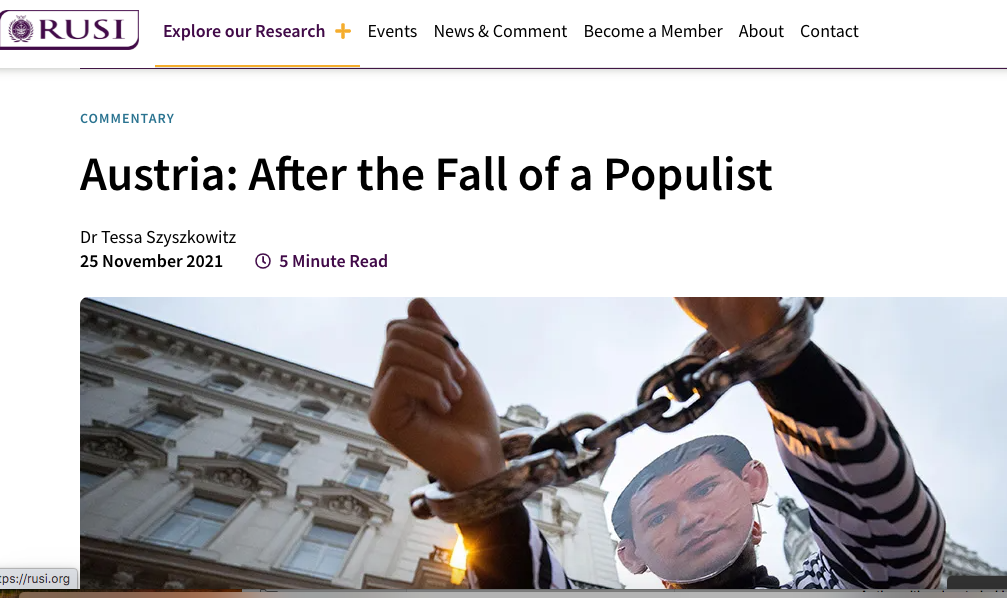Before his spectacular resignation in October, Austria’s Chancellor Sebastian Kurz was widely credited for being one of the biggest political talents in the history of his country. A fascinating case of the rise and fall of a Meisterpopulist.
Just before he fell from grace, Sebastian Kurz showed his true colours. ‘The pandemic is over for people who are vaccinated’, he proclaimed in September 2021. The 35-year-old former chancellor of Austria blatantly ignored the warnings of scientists that the vaccination rate in Austria was too low and this would prove dangerous for the entire population in the autumn. At that time, only 60% Austrians were vaccinated, which was the lowest number in any western EU country.
By the middle of November, the fourth wave of COVID-19 had taken Austria into its deadly embrace. Still, only 66% percent of the population is fully vaccinated, and the small republic of nine million people is currently recording the highest COVID-19 numbers of any EU member state. In some regions like Salzburg and Upper Austria, doctors are on triage: they have to decide whom to save. In some hospitals, corpses are stored in hallways.
The Meisterpopulist, meanwhile, has fallen silent. In a spectacular development, Austria’s hugely popular former chancellor was forced to resign a few weeks ago over allegations of corruption and bribery, best described by the Austrian expression Freunderlwirtschaft (crony capitalism). On a rainy October morning, the State Prosecutor for Corruption had raided the former chancellor’s office and seized his team’s mobile phones and hard discs.
Kurz always made his voters believe that he was the nice boy from next door whom they could trust
Kurz and his ‘praetorians’, as they called themselves in internal chats, stand accused of placing manipulated opinion polls in a friendly newspaper in return for lucrative government advertisement contracts. Whether or not Kurz will actually be charged is still unclear. In the worst-case scenario he faces up to 10 years in prison.
The Rise of the Populist
But what cannot be undone is the political damage. The country has now seen what lurks behind the slick young populist’s face. Chat protocols revealed the vulgar language Kurz used against his predecessor as leader of the conservative Austrian People’s Party (ÖVP), Reinhold Mitterlehner, as well as the dirty tricks he used to unseat Mitterlehner – by pushing for news that made his own party and its then leader look bad.
Kurz subsequently rebranded the tired, old ÖVP as a new movement of young conservatives, claiming ‘a new style’. He did not shy away from a coalition with the far-right Freedom Party; he moved the ÖVP very far to the right in migration politics; and he moved his loyalists into lucrative power positions – but he always made his voters believe that he was the nice boy from next door whom they could trust.
After he staged a coup in his own party in 2017 to take power, he won early elections and formed a coalition with the far-right Freedom Party. This was short-lived and also terminated by corruption scandals. Yet Kurz emerged unscathed. New elections brought the popular chancellor to power again, and he went into coalition with the Green party in January 2020. Since the coronavirus pandemic gripped the world, the two unlikely partners have stuck together in an unhappy alliance.
And His Fall
Austria has still not recovered from the political shock of Kurz’s resignation. Initially, his allies in the party rallied around him and wanted him to stay in power. When that strategy failed because the political fallout was too big, everyone wanted the coalition between Kurz’s party and the Greens to continue. Neither the ÖVP nor the Greens could see how they could gain from new elections – and nor could the weak Social Democrats or the disgraced Freedom Party.
The corruption scandals and the mismanagement of the coronavirus pandemic have not only undermined democratic institutions; the health and safety of the population is also at stake
Kurz then ‘stepped aside’, in what his allies called an attempt to put a placeholder into the office of chancellor while retaining power as party leader. As his successor, he chose not a politician, but one of Austria’s top diplomats, who happened to be a most loyal friend. Former foreign minister Alexander Schallenberg is unlikely to pose a threat in any future power struggle.
But Kurz’s plan to sit the scandal out on the sidelines does not seem to be working. Schallenberg looks too weak to guide Austria through one of the biggest crises in Austrian history – one for which Kurz himself is directly responsible. The corruption scandals and the mismanagement of the coronavirus pandemic have not only undermined democratic institutions; the health and safety of the population is at stake, too. For too long, Schallenberg tried to stick to Kurz’s pandemic message: no more lockdowns for vaccinated Austrians.
This populist approach has failed. Austria has now declared a general lockdown until 12 December in order to save the skiing season, which is vital for the country’s tourism industry. COVID-19 vaccinations will be made mandatory from February 2022. As a side effect, anger on both sides of the polarised Austrian public – vaccinated against unvaccinated – has reached boiling point.
With each passing day, the return of Sebastian Kurz seems less likely. On 18 November, parliament voted to lift his immunity. The prosecutor can now continue to investigate him. The 35-year-old, who just yesterday was considered to be one of the biggest political talents in Austria’s history – next to the one nobody wants to mention – seems to have risen and fallen due to his disruptive and dishonest populist manoeuvres.
Not only was he the youngest chancellor, but he is now also the youngest Altkanzler – ex-chancellor – of his country.



